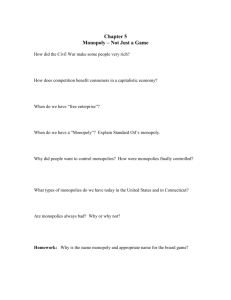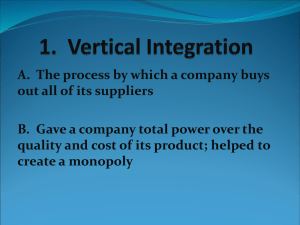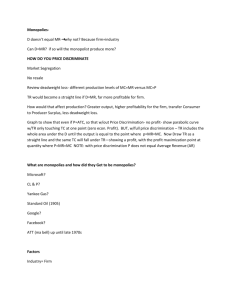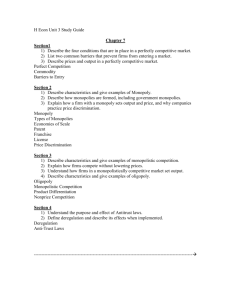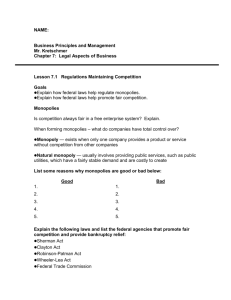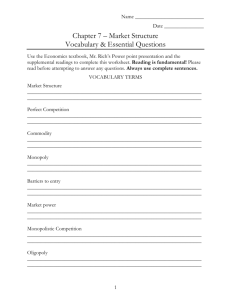Role of Government in the Economy Continued
advertisement
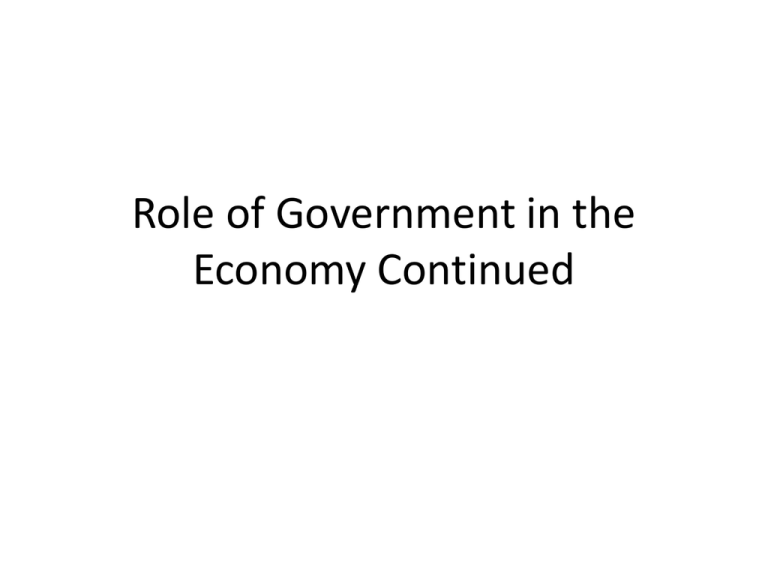
Role of Government in the Economy Continued The Role of Government in our Economy • Direct Services – – – – – Postal system Military Highways Education Police and fire • Regulation and Control – – – – Breaking up monopolies EPA FDA Patents • Stabilization and Growth – Control inflation and depression by adjusting tax rates, money supply – Change amount of spending by government (create a balanced budget) • Direct Assistance – Tariffs prevent certain items to remain free from foreign competition – Imports can be taxed – Subsidies to farmers – Welfare, Medicare, social security, helping poor Government and Competition Government policies keep firms from controlling the prices and supply of important goods. Antitrust laws are laws that encourage competition in the marketplace. 1. Regulating Business Practices The government has the power to regulate business practices if these practices give too much power to a company that already has few competitors. 2. Breaking Up Monopolies The government has used antitrust legislation to break up existing monopolies, such as the Standard Oil Trust and AT&T. 3. Blocking Mergers A merger is a combination of two or more companies into a single firm. The government can block mergers that would decrease competition. Defining a Monopoly • A monopoly is a market dominated by a single seller. – Monopolies form when barriers prevent firms from entering a market that has a single supplier. – Monopolies can take advantage of their monopoly power and charge high prices. Forming a Monopoly Different market conditions can create different types of monopolies. 1. Economies of Scale If a firm's start-up costs are high, and its average costs fall for each additional unit it produces, then it enjoys what economists call economies of scale. An industry that enjoys economies of scale can easily become a natural monopoly. 2. Natural Monopolies A natural monopoly is a market that runs most efficiently when one large firm provides all of the output. 3. Technology and Change Sometimes the development of a new technology can destroy a natural monopoly. Government Monopolies A government monopoly is a monopoly created by the government. • Technological Monopolies – The government grants patents, licenses that give the inventor of a new product the exclusive right to sell it for a certain period of time. • Franchises and Licenses – A franchise is a contract that gives a single firm the right to sell its goods within an exclusive market. A license is a government-issued right to operate a business. • Industrial Organizations – In rare cases, such as sports leagues, the government allows companies in an industry to restrict the number of firms in the market. Anti-Competitive Practices In addition to monopolies, other business activities may be considered illegal by the government. Collusion Cartels • Collusion is an agreement among members of an oligopoly to set prices and production levels. Pricefixing is an agreement among firms to sell at the same or similar prices. • A cartel is an association by producers established to coordinate prices and production. Deregulation Deregulation is the removal of some government controls over a market. • Deregulation is used to promote competition. • Many new competitors enter a market that has been deregulated. This is followed by an economically healthy weeding out of some firms from that market, which can be hard on workers in the short term.
